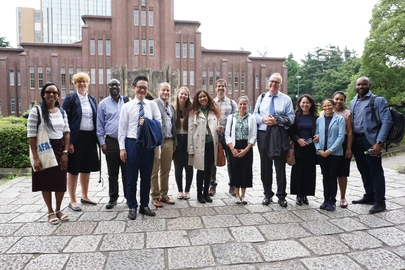Japan-excursion and blog: ZEF researchers explore seaweed-bed depletion and sustainable common pool resource management
June 19, 2023.
Ten doctoral students and four faculty members from the Center for Development Research (ZEF) have embarked on a research trip to the Japanese capital Tokyo and the island of Hokkaido from June 17-25, 2023. The ZEF researchers will blog about research trip to Japan, where international exchange and field research on saving seagrass beds and promoting sustainable fishing are at the focus. The trip will be carried out in cooperation with and with participation of students from the University of Tokyo, i.e. its Global Leadership Initiative (GPSS-GLI, which is part of the Division of Environmental Studies at the Graduate School of Frontier Sciences), and its International Program in Agricultural Development Studies (IPADS).
Find the full excursion program here.
News by Bonn University here (English) and here (German)
Blog 1: Tokyo, June 19, 2023: The Power of Community and Collaboration
Blog 2: Tokyo - Sapporo - Ishikari (windpark) - Mashike, June 20, 2023: From Big Fish to Small Fish
Blog 3: Mashike, seabed restoration sites. June 21, 2023: Can Water be too Clean?
Blog 4: Hokkaido, cultural heritage. June 22, 2023: Experiencing the Values of Omotenachi (hospitality) and Kyoryoku (cooperation)
Blog 5-6: Returning to and wrapping up in Tokyo. June 23-24, 2023. What we take with us and will remain from Mashike
ZEF-delegation
The ZEF-delegation consists of (in the photo on top of page from left to right): Dr. Juliet Wanjiku Kamau, ZEF senior researcher und coordinator of the ZEF-IPADS exchange program at ZEF; Dr. Silke Tonsjöst, Academic coordinator of the BIGS-DR Doctoral Program at ZEF; Qambemeda Masala Nyanghura, ZEF doctoral student; Professor Mitsuo Yamamoto, Associate Professor and coordinator of the IPADS program at the University of Tokyo’s Graduate School of Interdisciplinary Information Studies; Trevor Ray Tisler; Sara Velander; Micely Diaz Espaillat; Felipe Quartucci; Maria Luisa Espinel Ramos (all five are ZEF doctoral students); Professor Christian Borgemeister, ZEF-Director; Gretchen Gonzaga; Anni Beukes; Sakshi Abrol; Christopher T Okolo (all four are ZEF doctoral students).
The students will be tackling urgent questions relating to the marine environment, agriculture and resource management at the University of Tokyo over the next eight days. The doctoral students from Brazil, Colombia, the Dominican Republic, India, Namibia, Nigeria, Sweden, the Philippines, Tanzania and the US will be writing a blog about their journey and their research activities in the field.
Looking into Common Pool Resources
The researchers from ZEF/University of Bonn will conduct fieldwork, which will concentrate on two areas in particular: the restoration of seagrass beds and the sustainable management of common pool resources. The decline or depletion of seagrass beds is a serious problem in coastal regions around Japan and across the world. The soil is being made infertile by higher seawater temperatures caused by global heating, grazing by sea urchins and fish, and a lack of nutrients on the land. The research unit that is hosting them in Japan is focusing on iron deficiency and has already developed a method for restoring seagrass beds using iron fertilizer. The doctoral students from Bonn will be visiting the first place where this method is being implemented—Mashike in northwestern Hokkaido—and observing the relationship between rice fields and the coastal environment. They will also conduct interviews with representatives of fishing cooperatives and local government.
Fishing is considered to be one of the typical cases of common pool resources that often lead to the phenomenon known as the “tragedy of the commons.” In the past, the introduction of ownership rights has frequently been discussed as the only viable solution for preventing this tragedy. However, Japan has a strong tradition of co-management or community-based management of natural common pool resources. During their time in Japan, the researchers from the University of Bonn will be finding out about the role of institutions and the rules and standards introduced by the Fisheries Cooperative Association to ensure sustainable fishing.
Keep checking back to learn more about what the participants have been doing. With its combination of lectures, fieldwork, participatory observation and interviews, the program is designed to give students a comprehensive understanding of the complex links between agriculture, the marine environment and the management of common resources.
Background: A close partnership with Japan
The University of Bonn and the University of Tokyo (UTokyo) have collaborated on a range of topics for many years now. UTokyo is also the ZEF’s main partner in Japan. Since 2016, the ZEF and UTokyo have been actively engaged in teacher and student exchanges and in organizing joint trips, most notably in cooperation with the International Program in Agricultural Development Studies (IPADS) at UTokyo. The partnership was expanded in 2022 when UTokyo’s Graduate Program in Sustainability Science—Global Leadership Initiative (GPSS-GLI) was added to the exchange program, in which some 20 students from the ZEF have already taken part.
About the University of Tokyo
The University of Tokyo (UTokyo) was established in the Japanese capital in 1877. Nearly 29,000 students, 15 percent of whom come from abroad, are enrolled across all its degree programs. It has 10 faculties and 15 graduate schools, including the Graduate School of Agricultural and Life Sciences and the Graduate School of Frontier Sciences, with which the ZEF is collaborating more closely.


